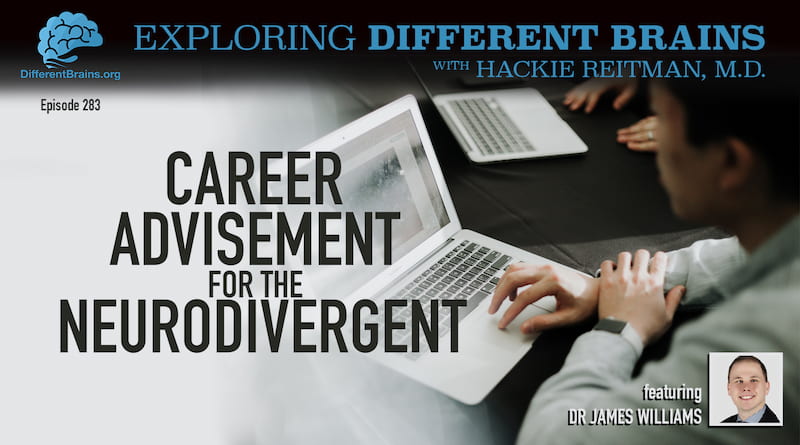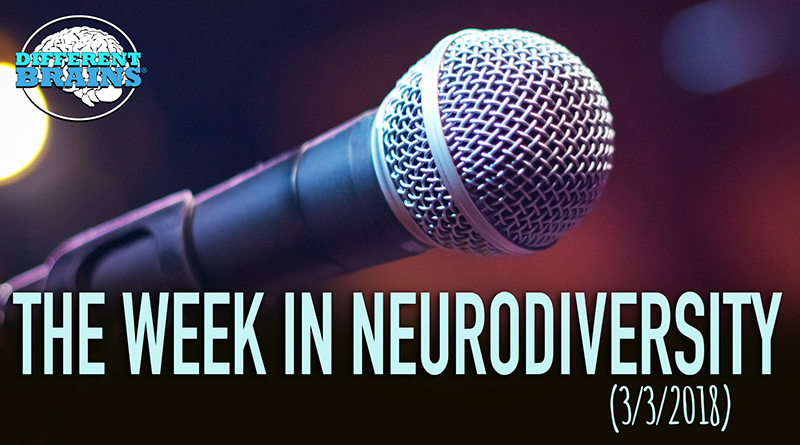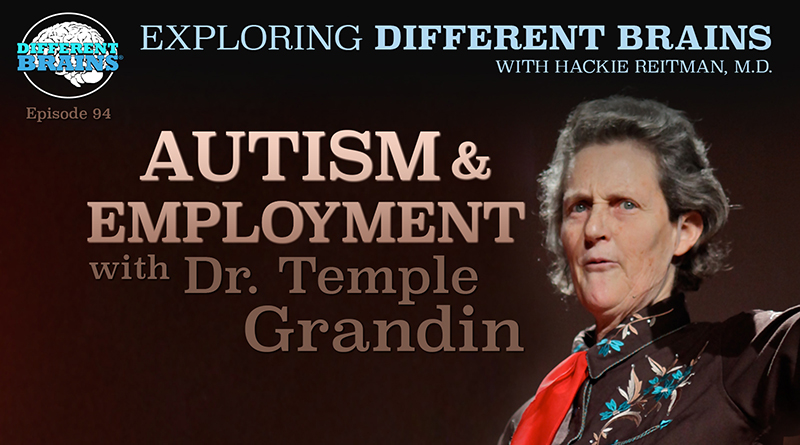
Autism and the Family: Therapeutic Solutions for the Household, with Dr. Lauren Gerber | EDB 40
In this episode, Harold Reitman, M.D. speaks with author and psychologist Dr. Lauren Gerber. Dr. Gerber discusses her experiences offering therapeutic solutions to children with autism and their families. She also talks about her three books, including one she wrote with her son to help deal with grief.
For more on Dr. Gerber, visit: DrLaurenGerber.com
Look for her books on Amazon:
Does God Have An E-mail Address?
35 Second Preview:
To listen or download the podcast version of this episode, see the embedded player below.
Or look for us on your favorite podcast provider:
iTunes | Stitcher | SoundCloud
[expand title=”View Full Transcript”]
HACKIE REITMAN, M.D. (HR):
Hi, I’m Dr. Hackie Reitman, welcome to another episode of Exploring Different Brains. Today, were real lucky to have the psychologist and author, Dr. Lauren Gerber here. Lauren, welcome!
- LAUREN GERBER (LG):
Thank you for having me, Hackie.
HR:
So what kind of psychology do you do?
LG:
That’s a very good question. A little bit of everything I think. Been doing it 20 years now, so its evolved over time.
HR:
And you treat individuals and families?
LG:
Child and families, I used to say–and now I say all children that have grown up into adulthood with me can still stay.
HR:
So you’ve treated people for a long time?
LG:
Yes.
HR:
Okay. What’s the big difference between treating a child and an adult?
LG:
Children make a lot of progress.
HR:
Adults not so much, huh?
LG:
Children are young, they’re interested in making change, they’re motivated, they’re not set in their ways generally, so there is a lot of room for positive energy and hope. So there is a tremendous amount of hope in my practice.
HR:
Now where are you from originally?
LG:
Chicago, Illinois.
HR:
All right, and you practiced in Chicago for some time, right?
LG:
Yes.
HR:
And did you do a lot of school psychology then?
LG:
I spent about a decade in the school systems doing a lot of testing, evaluations. That was during a time when children were labeled in order to get services, its changed a little bit now. Now more the direction has gone response to intervention; so pretty much anyone who has a need can get some help in the school system, if they demonstrate the need.
HR:
Now how did you get into writing?
LG:
Writing evolved out of my practice. Working with families. I would give little assignments, my first book, “Kitchen Table Therapy,” is a compilation of all these little take-home things. Families would come in and say, were having a really hard time at the dinner table with manners, and so I’d say, well why don’t we try this? And make a little game out of it. And they would go home and practice it. But, more interestingly, they would come in and say, oh, I told my neighbor about this, and they’re doing it, too. And then months would go by and another family would come up with something they were working on and I’d give them an exercise to work on at home, again, at the dinner table, and it became a way to take child psychology into the home. And so I put it together into a book, and the writing evolved naturally from the work.
HR:
And how does somebody find that book?
LG:
The book is online, both on my website and Barnes&Noble.com.
HR:
Okay, what is your website?
LG:
www.DrLaurenGerber.com.
HR:
So I’ve looked at some of your books and they have fantastic illustrations. Tell us about your illustrator?
LG:
Norman Bendelle and I have been working together for about a decade. He is a humorous illustrator, so he takes very serious topics, and he brings to them humor and real-life genuineness that really make the reader understand what ever he is talking about. So I love his work.
HR:
Now do you have any sub-specialty, Lauren, within your practice of psychology?
LG:
I think within my practice, child and family and parenting would be sub-specialties, but probably also autism. Norman Bendelle and I are working on the Dr. Lauren Library, and the first book in that library is on autism. We’re taking diagnoses that children are given and then we’re describing them using his humorous way of illustrating from the first person, and then using that story like to lead into a professional guide for parents and adults, where there are websites listed, diagnostic criteria listed and other things.
HR:
How did you get into autism?
LG:
Naturally, I think. The diagnoses, when DSM came out, just recently it became a very large spectrum, but the individuals that I were seeing all along with learning needs, social skills needs, various challenges interacting in their family, language needs–so a lot of different symptoms have now become a part of ASD or the Autism Spectrum disorder. So all of those children are being seen for different things and then it became a big-umbrella diagnosis. So I thought it was time to write something about it.
HR:
I made the first chapter in the Aspertools book–I made the first chapter in the Aspertools book anxiety, because I think that plays a big part in everything. What’s been your experience with anxiety?
LG:
Anxiety, to me, if we’re not looking at it as a diagnosis but as a state of feeling, is the state of not feeling comfortable in your own skin. And so anybody who walks into the office who’s asking me to respectfully journey through their life with them, are coming in because they have some degree of anxiety about how they’re living, and they want some help, and they want somebody to reflect back–someone to be a sounding board–someone to help with that anxiety. So anxiety seems to be co-morbid with many other types of disabilities.
HR:
With these kids who are on the spectrum having learning disabilities or challenges, what have you noticed about their family structure? Is there any commonality?
LG:
If they come to my office they are being brought in by parents who care; parents who are trying to find some help, who need a multi-disciplinary team. They probably already have been to a neurologist, a psychiatrist, their pediatrician, and those individuals said, let’s put our heads together and get a child psychologist involved. So caring families; supporting families. But families that have been on this train for a little while, and they want to know, are there other options? What can they do to make life easier?
HR:
What do you tell the siblings? What do you tell brothers and sisters?
LG:
The siblings are often in family therapy with me, not in their own individual therapy necessarily. But we have a big white board in the office and I’ll write on it and I’ll say here’s mom, here’s dad and here’s the child that I’m seeing and the siblings, and well talk about, how does everything affect you? This whole big picture? And I think that siblings are very adapted saying how they feel. In the book, autism and you, there’s a sibling to Billy, and his sister is, people call, “neurotypical,” does not have any kind of diagnosis, and she gets a B on a paper and comes home crying because she feels so badly about herself and has expected perfection because every bit of attention, in her view is going to her brother who has so many needs, who doesn’t talk; who is not verbal, who needs therapy from physical therapists and occupational therapists and speech and language therapists and psychologists; so the sibling often feels lost in the shuffle. And expresses it therapeutically, and it can be helpful for the family dynamic to learn how to deal with that.
HR:
Tell our viewers and listeners some of the books you’ve written so far.
LG:
Well, my first and earliest book, that didn’t get published first, is called, “Does God Have an Email Address?” And it’s probably my favorite because its dear to my heart. My son’s Labrador passed away and we were lying in bed; he was a young teen at the time trying to figure out why his dog died–his dog was hit by a car in a tragic accident–and I wrote that story with him, and Norman Bendelle illustrated it. So that might be my favorite. It’s a therapeutic tool only in the sense that grief and loss are different for each person and it shows my son and his process that he went through with grief, and it highlights some of the things that some other individuals might go through, like wishing to turn back time, wishing to have a miracle come along; things that, if you had another family member dying of something, or ill, then you might have the same wish fulfillment. So it’s an interesting book. The second one that I alluded to earlier was Kitchen Table Therapy and that’s therapeutic, fun activities. It’s a guide for a family. A fun little guide. And the most recent is Autism and You. Which is the book on autism. And that’s going to be one of many diagnoses. We’re working ADHD and You right now.
HR:
So you’re going to have a different children’s book, are these children’s’ books?
LG:
These are all–they’re meant to go to both the child audience and the adult audience. So they’re an interesting hybrid book, because the first part is a story that you could tell a sibling of a child with ADHD or read to a school class who is trying to understand why somebody has to go walk papers to the office and is hyper-active and can’t sit still. So it’s a book that’s a story and then it’s a resource guide in the back. So it’s both a children’s and an adults book.
HR:
Well, we’ve been talking with Dr. Lauren Gerber, the psychologist and author. Thank you so much, Lauren, for being with us today.
LG:
Hackie, thank you for having me. It’s been a pleasure.
[/expand]
This video is owned by Different Brains Inc, kindly donated by it’s original producer PCE Media LLC.
Different Brains® Inc. founder Harold “Hackie” Reitman, M.D. is an author, filmmaker, retired orthopedic surgeon, former professional heavyweight boxer, the past chairman and president (and current board member) of The Boys and Girls Clubs of Broward County, and a neurodiversity advocate. However, it was his role as a father that led to the creation of the DifferentBrains.org website.
Hackie’s daughter Rebecca grew up with epilepsy, 23 vascular brains tumors, and underwent 2 brain surgeries before the age of 5. Her struggles and recovery put him on the road to, through 26 professional heavyweight boxing matches, raising money for children’s charities (to which he donated every fight purse).
Rebecca eventually went on to graduate from Georgia Tech with a degree in Discrete Mathematics, and Dr. Reitman wrote and produced a film based on her experiences there (The Square Root of 2, starring Darby Stanchfield of ABC’s Scandal). After graduation, Rebecca received a diagnosis of Asperger’s syndrome. Hackie, shocked at his own ignorance of the topic despite being an M.D., embarked on years of research that culminated with his book Aspertools: The Practical Guide for Understanding and Embracing Asperger’s, Autism Spectrum Disorders, and Neurodiversity (released by HCI books, publishers of the Chicken Soup for the Soul series).
This experience revealed to Hackie the interconnectedness of the conditions that fall under the neurodiversity umbrella, while alerting him to the in-fighting and fractured relations that often plague the organizations tasked with serving the community. Convinced that overcoming these schisms could help all of society, Hackie forged the Different Brains philosophy of inclusive advocacy: “Supporting Neurodiversity – From Autism to Alzheimer’s and All Brains In Between”.
In the company’s initial years of operation, Hackie self-financed all of the content on DifferentBrains.org, all of which offered free to view to the public. Currently he is the host of our weekly interview show Exploring Different Brains, writes blogs for the site, and tours the country speaking at conferences, conventions and private functions, all with the goal of improving the lives of neurodiverse individuals and their families, and maximizing the potential of those with different brains. Separate from Different Brains, Hackie is the founder and CEO of PCE Media, a media production company focusing on reality based content. He recently co-executive produced the documentary “Foreman”, the definitive feature documentary on legendary boxer and pitchman George Foreman.




